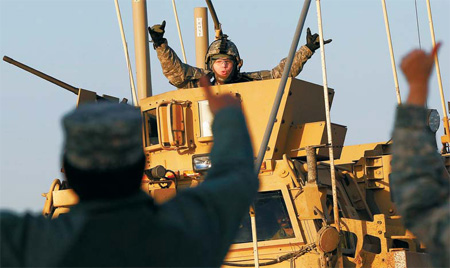US diplomats face Iraq challenge as troops leave
Updated: 2011-12-19 07:51
By Andrew Quinn (China Daily)
|
|||||||||
|
A US soldier celebrates after crossing into Kuwait during the last convoy out of Iraq on Sunday. The last convoy of US soldiers pulled out of Iraq on Sunday, ending nearly nine years of war that cost almost 4,500 US and tens of thousands of Iraqi lives. [Shannon Stapleton / Reuters] |
WASHINGTON - As the last US soldiers leave Iraq, the US State Department assumes the reins of a complex and risky operation, the success or failure of which could determine whether the costly nine-year US engagement with the country finally bears fruit.
US diplomats, shielded by thousands of security contractors, will seek to monitor Iraq's fragile political evolution and push ahead with civilian aid programs designed to demonstrate the benefits of US friendship.
Their aim is to secure an alliance with a country neighboring Iran that, as a key oil producer, has seen its strategic importance to Washington increase sharply amid the political turmoil engulfing the Middle East.
But analysts say that, without US military protection, they may end up trapped in fortified diplomatic bunkers while bureaucrats at home struggle with the logistics of organizing and securing one of the biggest US diplomatic endeavors ever undertaken.
This is something clearly that the State Department has never done before," said Patrick Kennedy, who oversees the huge transition portfolio as the undersecretary of state for management.
"We have excellent people at the State Department with management, acquisitions, logistical, security, communications and medical skills," Kennedy said. "We are ready."
Iraq analysts are less certain, pointing to the recent bomb blast within Baghdad's heavily secured Green Zone as a sign of the perils ahead for the US civilian force charged with winning the peace after Iraq's long and costly conflict.
"I think there is a lot of very serious concern about the department's ability to take the lead on all of this given the cuts it has faced over the years and how difficult it has been for them to operate in semi-war zones," said Brian Katulis, a security expert at the Center for American Progress.
The United States and Iraq had long sought to craft a deal that could have kept thousands of US troops in the country as military trainers. But those talks collapsed in October, forcing the State Department to go forward alone.
A handful of US military personnel will remain in the country, working with the embassy to help with arms sales and training for Iraqi forces. Talks could resume next year on whether more US troops can return for future training missions.
In the meantime, US officials say there will be roughly 16,000 people involved in the US diplomatic effort in Iraq.
About 2,000 will be diplomats and federal workers. The remaining 14,000 will be contractors - roughly half involved with security while the rest will be doing everything from keeping the kitchens running to managing the motor pool.
The operation will focus on the fortress-like US Embassy in Baghdad - the largest and most expensive US diplomatic mission in the world - as well as at consulates in Basra, Erbil and Kirkuk, each of them "hardened" to resist militant attack.
The US mission in Iraq has already been scaled back. Officials originally envisioned opening more consulates and expanding other operations under a plan the Senate Foreign Relations Committee estimated could end up costing as much as $30 billion over five years.
Reuters












